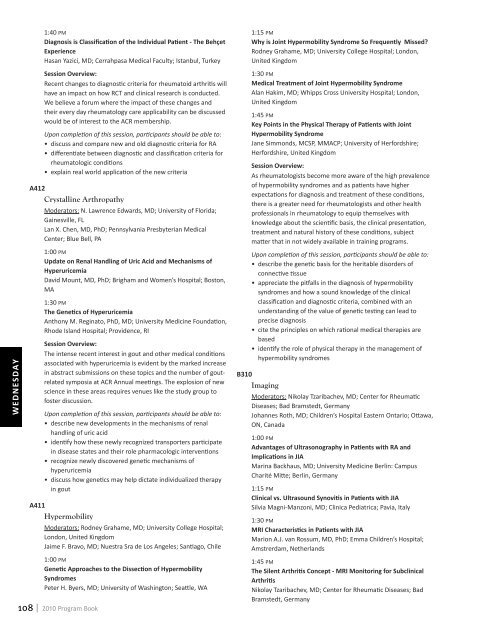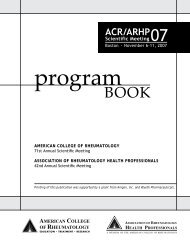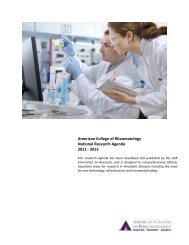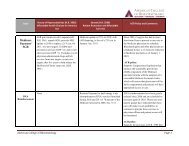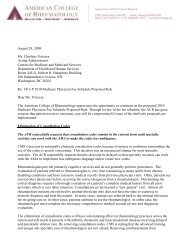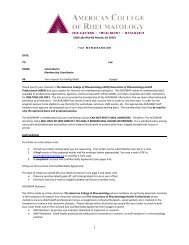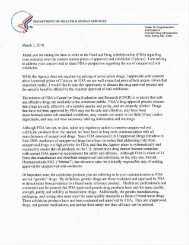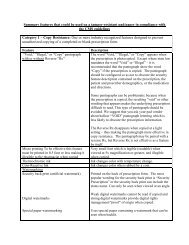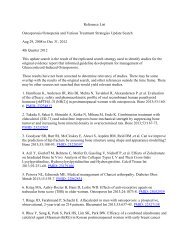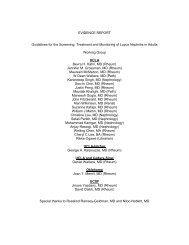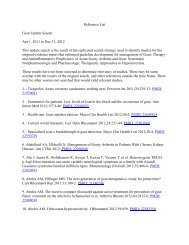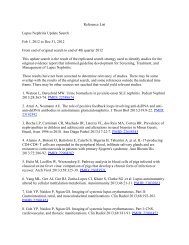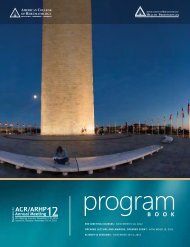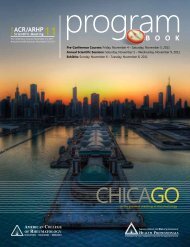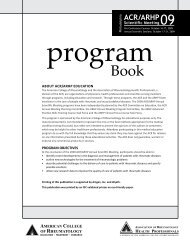B O O K - American College of Rheumatology
B O O K - American College of Rheumatology
B O O K - American College of Rheumatology
Create successful ePaper yourself
Turn your PDF publications into a flip-book with our unique Google optimized e-Paper software.
wednesday<br />
108<br />
1:40 PM<br />
Diagnosis is Classification <strong>of</strong> the Individual Patient - The Behçet<br />
Experience<br />
Hasan Yazici, MD; Cerrahpasa Medical Faculty; Istanbul, Turkey<br />
Session Overview:<br />
Recent changes to diagnostic criteria for rheumatoid arthritis will<br />
have an impact on how RCT and clinical research is conducted.<br />
We believe a forum where the impact <strong>of</strong> these changes and<br />
their every day rheumatology care applicability can be discussed<br />
would be <strong>of</strong> interest to the ACR membership.<br />
Upon completion <strong>of</strong> this session, participants should be able to:<br />
• discuss and compare new and old diagnostic criteria for RA<br />
• differentiate between diagnostic and classification criteria for<br />
rheumatologic conditions<br />
• explain real world application <strong>of</strong> the new criteria<br />
A412<br />
Crystalline Arthropathy<br />
Moderators: N. Lawrence Edwards, MD; University <strong>of</strong> Florida;<br />
Gainesville, FL<br />
Lan X. Chen, MD, PhD; Pennsylvania Presbyterian Medical<br />
Center; Blue Bell, PA<br />
1:00 PM<br />
Update on Renal Handling <strong>of</strong> Uric Acid and Mechanisms <strong>of</strong><br />
Hyperuricemia<br />
David Mount, MD, PhD; Brigham and Women’s Hospital; Boston,<br />
MA<br />
1:30 PM<br />
The Genetics <strong>of</strong> Hyperuricemia<br />
Anthony M. Reginato, PhD, MD; University Medicine Foundation,<br />
Rhode Island Hospital; Providence, RI<br />
Session Overview:<br />
The intense recent interest in gout and other medical conditions<br />
associated with hyperuricemia is evident by the marked increase<br />
in abstract submissions on these topics and the number <strong>of</strong> goutrelated<br />
symposia at ACR Annual meetings. The explosion <strong>of</strong> new<br />
science in these areas requires venues like the study group to<br />
foster discussion.<br />
Upon completion <strong>of</strong> this session, participants should be able to:<br />
• describe new developments in the mechanisms <strong>of</strong> renal<br />
handling <strong>of</strong> uric acid<br />
• identify how these newly recognized transporters participate<br />
in disease states and their role pharmacologic interventions<br />
• recognize newly discovered genetic mechanisms <strong>of</strong><br />
hyperuricemia<br />
• discuss how genetics may help dictate individualized therapy<br />
in gout<br />
A411<br />
Hypermobility<br />
Moderators: Rodney Grahame, MD; University <strong>College</strong> Hospital;<br />
London, United Kingdom<br />
Jaime F. Bravo, MD; Nuestra Sra de Los Angeles; Santiago, Chile<br />
1:00 PM<br />
Genetic Approaches to the Dissection <strong>of</strong> Hypermobility<br />
Syndromes<br />
Peter H. Byers, MD; University <strong>of</strong> Washington; Seattle, WA<br />
2010 Program Book<br />
1:15 PM<br />
Why is Joint Hypermobility Syndrome So Frequently Missed?<br />
Rodney Grahame, MD; University <strong>College</strong> Hospital; London,<br />
United Kingdom<br />
1:30 PM<br />
Medical Treatment <strong>of</strong> Joint Hypermobility Syndrome<br />
Alan Hakim, MD; Whipps Cross University Hospital; London,<br />
United Kingdom<br />
1:45 PM<br />
Key Points in the Physical Therapy <strong>of</strong> Patients with Joint<br />
Hypermobility Syndrome<br />
Jane Simmonds, MCSP, MMACP; University <strong>of</strong> Herfordshire;<br />
Herfordshire, United Kingdom<br />
Session Overview:<br />
As rheumatologists become more aware <strong>of</strong> the high prevalence<br />
<strong>of</strong> hypermobility syndromes and as patients have higher<br />
expectations for diagnosis and treatment <strong>of</strong> these conditions,<br />
there is a greater need for rheumatologists and other health<br />
pr<strong>of</strong>essionals in rheumatology to equip themselves with<br />
knowledge about the scientific basis, the clinical presentation,<br />
treatment and natural history <strong>of</strong> these conditions, subject<br />
matter that in not widely available in training programs.<br />
Upon completion <strong>of</strong> this session, participants should be able to:<br />
• describe the genetic basis for the heritable disorders <strong>of</strong><br />
connective tissue<br />
• appreciate the pitfalls in the diagnosis <strong>of</strong> hypermobility<br />
syndromes and how a sound knowledge <strong>of</strong> the clinical<br />
classification and diagnostic criteria, combined with an<br />
understanding <strong>of</strong> the value <strong>of</strong> genetic testing can lead to<br />
precise diagnosis<br />
• cite the principles on which rational medical therapies are<br />
based<br />
• identify the role <strong>of</strong> physical therapy in the management <strong>of</strong><br />
hypermobility syndromes<br />
B310<br />
Imaging<br />
Moderators: Nikolay Tzaribachev, MD; Center for Rheumatic<br />
Diseases; Bad Bramstedt, Germany<br />
Johannes Roth, MD; Children’s Hospital Eastern Ontario; Ottawa,<br />
ON, Canada<br />
1:00 PM<br />
Advantages <strong>of</strong> Ultrasonography in Patients with RA and<br />
Implications in JIA<br />
Marina Backhaus, MD; University Medicine Berlin: Campus<br />
Charité Mitte; Berlin, Germany<br />
1:15 PM<br />
Clinical vs. Ultrasound Synovitis in Patients with JIA<br />
Silvia Magni-Manzoni, MD; Clinica Pediatrica; Pavia, Italy<br />
1:30 PM<br />
MRI Characteristics in Patients with JIA<br />
Marion A.J. van Rossum, MD, PhD; Emma Children’s Hospital;<br />
Amstrerdam, Netherlands<br />
1:45 PM<br />
The Silent Arthritis Concept - MRI Monitoring for Subclinical<br />
Arthritis<br />
Nikolay Tzaribachev, MD; Center for Rheumatic Diseases; Bad<br />
Bramstedt, Germany


